

Primary Knowledge Cu. About the Primary Knowledge Curriculum The Primary Knowledge Curriculum places ‘Powerful Knowledge’, knowledge that takes students beyond their own experiences, at the heart of the primary curriculum.
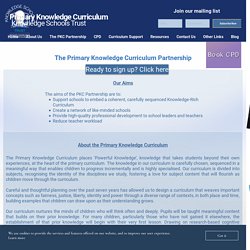
The knowledge in our curriculum is carefully chosen, sequenced in a meaningful way that enables children to progress incrementally and is highly specialised. Our curriculum is divided into subjects, recognising the identity of the disciplines we study, fostering a love for subject content that will flourish as children move through the curriculum. Careful and thoughtful planning over the past seven years has allowed us to design a curriculum that weaves important concepts such as fairness, justice, liberty, identity and power through a diverse range of contexts, in both place and time, building examples that children can draw upon as their understanding grows.
The Spy Who Loved Us – Part 1: “The name’s Beyond…..” “The design and implementation of the curriculum is at the heart of school life.

It creates the atmosphere for learning and sets the tone and philosophy for teachers.” from Creating Outstanding Classrooms: A whole-school approach by Oliver Knight & David Benson For those of you that aren’t familiar with the 10th film in the James Bond series, “The Spy Who Loved Me” is about a reclusive megalomaniac who plans to destroy the world and create a new civilisation. In April this year, author, blogger and chief provocateur David Didau – a.k.a. @LearningSpy – came to work with our fabulous English department to help them to plan their new curriculum and post-levels assessment system. I’ll leave you to draw your own comparisons. The whole process began early in February this year via a few Direct Messages through Twitter, followed up with a quick chat at the NTEN conference at KEGS to agree dates, before finally confirming the intended outcomes via e-mail, which looked something like this: e.g.
Building a curriculum with firm foundations. Something that has always bemused me is the opposition that arises whenever it is suggested that what children learn in the foundation stage should prepare them to be ready for year one.
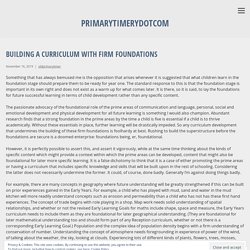
The standard response to this is that the foundation stage is important in its own right and does not exist as a warm up for what comes later. It is there, so it is said, to lay the foundations for future successful learning in terms of child development rather than any specific content. History Curriculum Map. Curriculum – Cobham Primary School, Kent. An evidence-informed approach to curriculum design. By Andy Tharby.
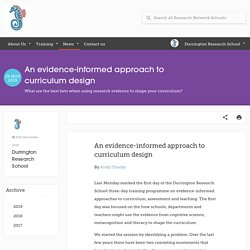
Your curriculum defines your school. Own it. Shape it. Celebrate it. KS3 curriculum blog – When in Rome… Taking curriculum seriously. Applying the ‘powerful knowledge’ principle to curriculum development in disadvantaged contexts. Curriculum Overview. A curriculum that promotes the school’s culture and aims “The Christian life is a call to a deeper communion with God and with one another, and this finds particular expression in our schools, which are rightly recognised as being families themselves, where no one is a stranger and where everyone, whatever his or her background or academic ability, is welcomed, treasured, supported and helped to become the person whom God calls them to be.”
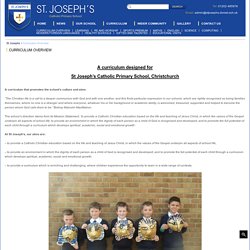
Bishop Malcolm MacMahon. The school’s direction stems from its Mission Statement: ‘to provide a Catholic Christian education based on the life and teaching of Jesus Christ, in which the values of the Gospel underpin all aspects of school life; to provide an environment in which the dignity of each person as a child of God is recognised and developed; and to promote the full potential of each child through a curriculum which develops spiritual, academic, social and emotional growth’. At St Joseph’s, our aims are: The madness of writing Schemes of Work or how I fell in love with curriculum design. Why do people keep asking us to redo schemes of learning?
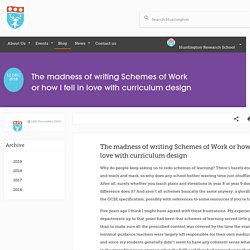
There’s barely enough time to plan and teach and mark, so why does any school bother wasting time just shuffling things around? After all, surely whether you teach plans and elevations in year 8 or year 9 doesn’t really make a difference does it? And aren’t all schemes basically the same anyway: a glorified re-ordering of the GCSE specification, possibly with references to some resources if you’re lucky? Five years ago I think I might have agreed with these frustrations. Primarycoloursart.
In praise of a prosaic curriculum. In case you’ve been living in an underground bunker for the last year or two, the curriculum is now a thing.
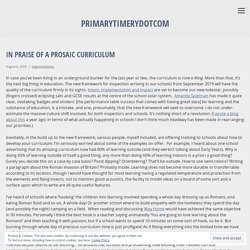
More than that, it’s the next big thing in education. The new framework for inspection arriving in our schools from September 2019 will have the quality of the curriculum firmly in its sights. Intent, implementation and impact are set to become our new lodestar, possibly (fingers crossed) eclipsing sats and GCSE results at the centre of the school solar system.
Amanda Spielman has made it quite clear, mistaking ‘badges and stickers’ [the performance table success that comes with having great data] for learning and the substance of education, is a mistake, and one, presumably, that the new framework will seek to overcome. I do not under-estimate the massive culture shift involved, for both inspectors and schools. Inevitably, in the build up to the new framework, various people, myself included, are offering training to schools about how to develop your curriculum. Like this: Rethinking planning – what if we plan not to finish? Whenever I think of lesson planning, it is usually in the form of filling the lesson time with a series of ‘activities’/actions that will happen during the lesson.
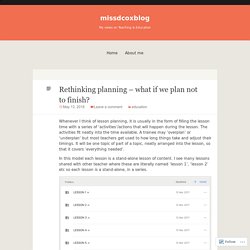
The activities fit neatly into the time available. A trainee may ‘overplan’ or ‘underplan’ but most teachers get used to how long things take and adjust their timings. It will be one topic of part of a topic, neatly arranged into the lesson, so that it covers ‘everything needed’. In this model each lesson is a stand-alone lesson of content. I see many lessons shared with other teacher where these are literally named ‘lesson 1’, ‘lesson 2’ etc so each lesson is a stand-alone, in a series. However, I generally don’t do this. (I have previously read a blog that links to this idea that a lesson isn’t a unit of learning by Bodil Isaksen ,A lesson is the wrong unit of time ,however sadly it no longer exists) What if we deliberately plan not to finish something? Why? Heathfield_English_Statement.pdf.
English Primary Curriculum 2014 - LTP - Resources - TES. The 2014 National Curriculum for primary English - English Week and National Curriculum reform - TES English - TES Community. Planning for the new English curriculum - Resources - TES.